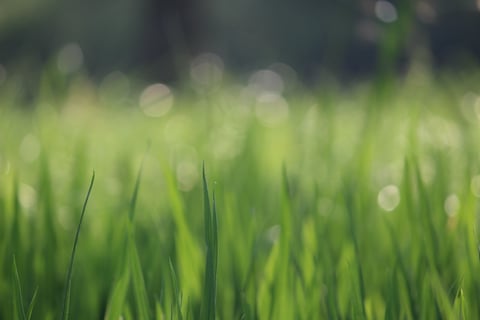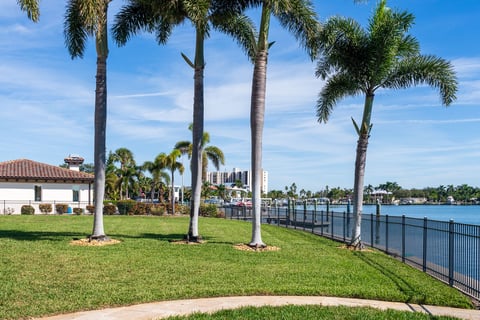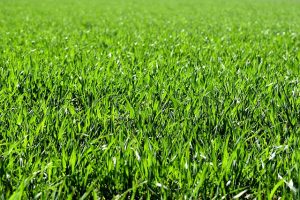


 Kaylie Gibbons
Kaylie Gibbons
You probably already know this, but mulch is a vital part of any landscape — especially so in Florida.
Think about it —we have weird weather, random bursts of insane moisture-then-drought-then-moisture-again, and wild amounts of weeds that grow in this humid hotbed of a state.
Mulch is vital for controlling and regulating all three of those things — and honestly, it also really helps in making a commercial landscape appear neat and tidy (even if your landscape maintenance may have taken a backseat the past few weeks, which, by the way, we can totally help with).
Including them in your commercial landscape plans in Tampa Bay can be beneficial for several reasons (it’s cost-effective, budget-friendly, and acts as a great protective layer for your landscape).
But this leads us to the biggest question — when is the best season for mulching?
This is a hotly debated topic among the landscaping biz, but after spending 20 years in the landscaping industry in Florida, we like to think we have a pretty good take on the answer.
Check out what we mean in this article!
If you’re thinking about winter as the ideal season to lay down a fresh layer of mulch, you’re not entirely off base.
Sure, there are better times to mulch — a lot of landscaping pros will tell you that mulching in the spring makes sense because it allows time for the soil to warm up and makes room for plant growth. We definitely recommend that because we think that (after clearing your beds of old mulch and debris) a fresh layer of mulch before summer hits can help keep weeds at bay and further your moisture retention (you know how hot and dry and it can get in the Florida summer).
That being said, we definitely think throwing on a new layer of mulch right before winter hits is a good idea, too.
Although we don’t necessarily get consistent hard freezes in Florida in the winter, we do get the occasional random cold snap and we certainly don’t get the level of irrigation our plants are used to. Adding in mulch before the “cold” hits can be really beneficial — it will keep your plants warmer, safer, and probably better hydrated, too!
So, all in all, if someone is telling you that your Tampa Bay commercial landscape doesn’t need a winter mulch layer, we suggest getting a second opinion. Overall, there’s really no terribly inconvenient time or silly time to mulch, although, setting a mulching scheduling around late spring and late fall certainly do seem to have their advantages.
Like we said, you shouldn’t write off mulching for the winter —maybe just try to avoid mulching in the middle of winter so your commercial landscape can begin reaping the benefits of the mulch before any random cold snaps hit.
When you add a protective layer of mulch over the soil, everything underneath that layer is going to stay warmer — it’s like a protective blanket, right? Because of this mulch layer, everything underneath is going to be protected from the harsher temperatures outside, meaning the delicate roots beneath the soil aren’t exposed to the extreme temperatures.
Logically, it makes sense that a layer of mulch over the top of your soil will keep the roots of your plants safe —like we said, it’s like a protective, insulated blanket. If you stick your feet under an insulated blanket they feel warmer, too, right? It’s the same thing.
But mulch can also help prevent damage from the cold to the parts of the flowers, plants, shrubs, and more that are above the ground. With warmer, better-protected soil, plants won’t deal with the freezing-and thawing-heave-ho that can come with winters. Translation? Warmer soil means less breakage and injury for the tops of your plants.
Mulching right before winter hits can also aid in how your soil adapts over time, meaning, if you mulch correctly, the way it breaks down could help improve your soil’s fertility.
When mulch decomposes, it adds its materials to the soil — if you’re using a quality mulch, it should improve the water holding capacity of your soil and aid in the phosphorous and nitrogen release into the soil.
With any luck, by the end of winter when you’re reading to rake out the old mulch and deposit the new, your soil structure will be largely improved and nutrient-rich for spring blooms.
Most importantly (we think, anyway) mulch helps to retain moisture —as you probably know, your commercial landscape likely isn’t getting a ton of irrigation during the winter. Not only are we seeing a lapse in those daily Florida rainstorms, but we’re also trying to sparingly irrigate —that can result in a thirsty landscape.
With a proper mulch layer, moisture will be better retained underneath your mulch, meaning you can irrigate less —something the earth (and your wallet) will likely appreciate.So, what’s the verdict? Are you thinking your commercial landscape in Tampa Bay could use a little winter mulch? Remember, in Florida, mulch can be pretty beneficial year-round, so if you feel like you missed the boat on winter mulching, adding in a fresh layer of mulch this spring is a great alternative, too. We’d love to chat with you about how we can help serve your commercial landscape — give us a call at (727)-201-3947 to discuss! Want to learn more about commercial landscaping trends? You’re in luck —our blog is regularly updated with commercial landscaping tips, tricks, inspiration, and advice! Check it out here!







Account Manager, Landscape Management for Landcrafters, Inc. Kaylie Gibbons is an account manager at Landcrafters offering 17 years of experience in the industry, having worked for other companies on the maintenance side and gaining vast knowledge of plants on the nursery side. With FNGLA and BMP certifications, Kaylie emphasizes communication in her client relationships, aiming to turn every spoken word into a reality for their landscape and the overall appearance of properties. Passionate about the landscape industry, Kaylie ensures her clients have the best experience from communication to the final project.